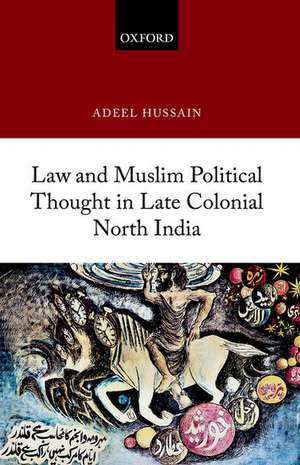Law and Muslim Political Thought in Late Colonial North India
Autor Adeel Hussainen Limba Engleză Hardback – 23 aug 2022
Preț: 497.52 lei
Preț vechi: 611.80 lei
-19% Nou
Puncte Express: 746
Preț estimativ în valută:
95.20€ • 99.60$ • 79.08£
95.20€ • 99.60$ • 79.08£
Carte tipărită la comandă
Livrare economică 22-28 martie
Preluare comenzi: 021 569.72.76
Specificații
ISBN-13: 9780192859778
ISBN-10: 0192859773
Pagini: 248
Dimensiuni: 144 x 223 x 18 mm
Greutate: 0.44 kg
Editura: OUP OXFORD
Colecția OUP Oxford
Locul publicării:Oxford, United Kingdom
ISBN-10: 0192859773
Pagini: 248
Dimensiuni: 144 x 223 x 18 mm
Greutate: 0.44 kg
Editura: OUP OXFORD
Colecția OUP Oxford
Locul publicării:Oxford, United Kingdom
Recenzii
Offering a striking new perspective on the making of Muslim politics in colonial India, Adeel Hussain argues that law and legal thinking came to comprise its primary site. Rather than sulking in their tents and taking to religion with the establishment of British rule, Muslims deployed the law to shape the colonial state as well as remake themselves into a polity without sovereignty. In the process, Hussain gives us a novel interpretation of political thought in colonial societies.
A new generation of young historians is redefining history itself as a way of grasping the meaning of certain traumatic political events of the past. Adeel Hussain brings a rare combination of expertise in history, law and the postmodernist innovations in interpretation of what were thought to be 'objective facts' to open up new questions about the nature of nationality and its relation to religion, of the legitimacy of Law as a solvent for disputes, and of the different ways of understanding the nature of the subaltern subjects. The fruits of his efforts are new ways of understanding the traumatic event of the Partition of British India. His book is erudite, compelling and a great read.
This is a remarkably lucid narration of a very complex phenomena in which law and philosophical discourse intersect in a bid to explicate historical situation. Adeel Hussain unravels the political and legal intricacies that punctuated the last two decades of united India. He has shed fresh light on the twists and turns that Muslim factional politics took in the run-up to partition. It indeed makes a pithy and profound reading.
A new generation of young historians is redefining history itself as a way of grasping the meaning of certain traumatic political events of the past. Adeel Hussain brings a rare combination of expertise in history, law and the postmodernist innovations in interpretation of what were thought to be 'objective facts' to open up new questions about the nature of nationality and its relation to religion, of the legitimacy of Law as a solvent for disputes, and of the different ways of understanding the nature of the subaltern subjects. The fruits of his efforts are new ways of understanding the traumatic event of the Partition of British India. His book is erudite, compelling and a great read.
This is a remarkably lucid narration of a very complex phenomena in which law and philosophical discourse intersect in a bid to explicate historical situation. Adeel Hussain unravels the political and legal intricacies that punctuated the last two decades of united India. He has shed fresh light on the twists and turns that Muslim factional politics took in the run-up to partition. It indeed makes a pithy and profound reading.
Notă biografică
Adeel Hussain is an Assistant Professor of Legal and Political Theory at Leiden University, The Netherlands, and a Senior Research Associate at the Max Planck Institute for Comparative Public Law and International Law in Heidelberg, Germany. Before joining Leiden University, Adeel clerked at the Court of Appeals in Frankfurt, worked for an international law firm, and advised the Government of Afghanistan on constitutional and administrative reform. His research focuses on jurisprudence, comparative constitutional law, international law, and the global history of legal and political thought, with an emphasis on South Asia and Europe. This is his first monograph.
